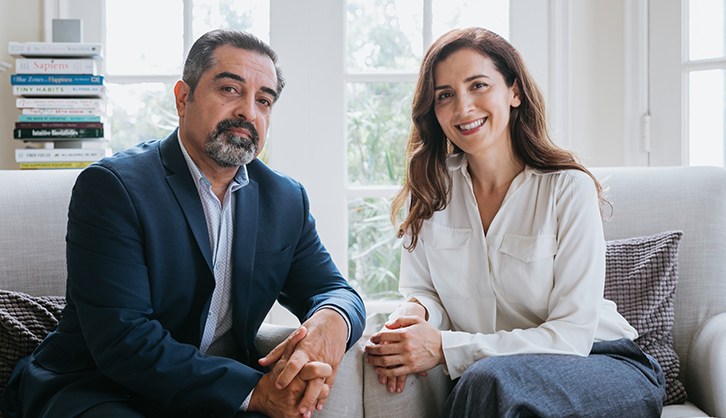Dr. Dean Sherzai’s Tips for Building a Bolder Brain
When future husband and wife Dr. Dean Sherzai and Dr. Ayesha Sherzai first met in Afghanistan in 2003, the two bonded over their mutual loss of a grandparent to Alzheimer’s. Dean was helping rebuild the healthcare system of the war-torn country and Ayesha was working for the esteemed nonprofit, Doctors Without Borders; but their shared medical training, experience and passions lay in neurology.
Returning to the U.S., they married and co-founded the renowned Alzheimer’s Prevention Program at Loma Linda University where they have dedicated their lives to helping eradicate the disease. Together they lead the largest community-based brain health initiative in the country, helping tens of thousands of patients, from the partially cognitively impaired to those who are suffering from Alzheimer’s, find hope through personal lifestyle intervention.
As researchers and scientists, the Sherzais were intent that their work would be supported by vast, robust data. They chose Loma Linda as the home for their program because of its Blue Zone designation, with a 50+ year ongoing study of over 97K people. As they studied their own database of over 3,000 patients, the results of lifestyle changes were profound.
“Under absolute optimal conditions, we think that as much as 90% of dementias can be prevented. Definitely 60% has been proven, but as much as 90%, if you do all optimal,” Dean Sherzai said. “And the optimal is not finding the holes in your system and filling it in with some vitamin concoctions. It’s simple lifestyle factors that one can start incorporating into your life.”
In an interview for the Growing Bolder podcast, we asked Dean for simple steps we can all begin taking to build a bolder brain. He shared five ways, under the acronym NEURO: Nutrition, Exercise, Unwind, Rest and Optimize Your Mental Activity.
5 Ways to Begin Building A Bolder Brain Today
1. NUTRITION: INCREASE YOUR GREENS.
Studies show that people who ate more spinach and dark leafy greens have brains that appear 11 years younger. Additionally, reduce your saturated fat and reduce your simple sugars, in a measurable way. “We all say it, but then we return to our normal habits. Do it measurably,” Sherzai outlined. “‘This day, this day and this day, I’m not going to have saturated fat and I’m not going to have sugar.’ That’s measurable, that’s retainable, that’s great.”
2. EXERCISE: MOVE THROUGHOUT THE DAY.
You don’t have to go to a gym. Watch two of your shows while doing a few mini squats or steps in place. Slow steps are fine or even just standing. Work your way to 25 minutes daily of brisk walking. Research shows a 45% reduction from mild cognitive impairment to dementia in people who walk briskly and build their leg strength.
3. UNWIND: BUILD YOUR LIFE AROUND GOOD STRESS.
Our brains want to be challenged – don’t get lazy. Take classes, learn to play a new musical instrument, discover new music, or learn to dance. And reduce the existing stressors in your life by identifying them and then systematically decreasing or eliminating them as much as possible.
4. REST: INVEST IN YOUR SLEEP.
Sleep is the ultimate cleanse and sleep hygiene is critical. Create a positive space, lower the sound and reduce the light before bed. We need four to five cycles of deep sleep every night. If you’re sleeping seven to eight hours and still feel tired, or you’re moving throughout the night go to a university-based sleep facility and get tested for sleep apnea.
5. OPTIMIZE: BUILD YOUR BRAIN AROUND PURPOSE.
Optimize your cognitive activity through social activities such as volunteering, joining groups, taking classes with others, learning a musical instrument, joining bands, or just learning new things, but in a social setting.
The Harvard Study of Adult Development has followed over 700 men for over 80 years and expanded to include their spouses and over 1300 children. The one variable that stands out the most regarding longevity and vitality is the nature of the individual’s connections. Conversations with people who matter to us, around topics that have meaning to us, involve every aspect of our brain’s limbic system and increase connections between our neurons. If our brains are not being challenged, they begin to withdraw, pull back those connections and start shrinking.















